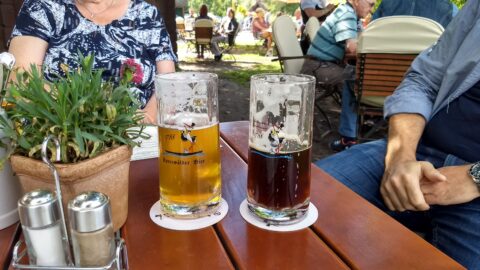Politeness aside, being a Brit in Europe after „Brexit“ makes me want to apologise for my own existence, or rather for the people who voted to leave.
By Emma Wallis When I woke up on the 24 June 2016, something had cracked between me and my country of birth. I was in Greece at the time, cradle of European civilisation, and even the blue waters of the Aegean failed to calm my anger and rising sense of dislocation. When I heard fellow Brits bouncing around in the shallows, enjoying their holiday, I wondered if they were ‘for’ or ‘against’ the dreaded Brexit. Over a year later, that fault line in my former country remains. I say ‘former country’ because in the meantime I have become German. I felt happy and proud the day I went to my citizenship ceremony and mouthed the words to the German national anthem, too scared to sing lustily and mispronounce a word -thus demonstrating to the small crowd, that, in fact, I’m German in passport only. I try to feel German and European, to take on all the traits and cultural tics that I admire in this country and across the continent, but inevitably this is a pick and mix approach to nationality. Deep down, I can’t escape the fact that I am, essentially, still British.

“Yes,” confirm friends in Europe, smiling benignly, “no German or Italian or French person would wear those colours, or those shoes.” – “They are cool though,” they add, as a consolation. “You are so British and polite,” they say, when asked to define my characteristics, “oh god, sorry, I know,” I say, realising half-way through the sentence that I have just apologised for my own politeness and confirmed their point. Politeness aside, being a Brit in Europe after Brexit makes me want to apologise for my own existence, or rather for the people who voted to leave. I have to apologise to European friends living in the UK who have experienced negative comments from Brexiteers. I have to apologise to Europeans on the continent for the actions of half of my nation, and I guess I’m apologising to myself for rejecting half of what made me, that crazy perfidious island nation.
Bound by a sense of common culture
Europe itself is a melting pot. I have lived or worked and studied in four countries in Europe, visited many more and I’ve enjoyed picking the best of different ways of doing things and trying to bring a little piece home to wherever I’m residing at the time. I think most Europeans do that and have always done that. We are united in our differences but bound by a sense of common culture; threads of decency, morals, food, family, fairy stories, geography, history and weather which is experienced more or less intensely at different points on the map and over the year. In Germany, I am abroad, but I am home. The infrastructure and civil society is similar enough to the UK to give me confidence in the state, even as it sails on choppy waters towards a colourful coalition. I have family here and family in the UK. I straddle both sides of the channel. Brussels is the apex of that feeling. The melting pot at its rawest, where a gaggle of different nations come together on the Eurostar, keeping the connections between Britain and the continent alive, and well. But, what will I feel in 2019 when those ties are severed? I should imagine a huge sense of sadness and a great deal of anger. I can’t believe that so many people could vote for terms which were unknown to anyone because of some illusory need for independence. I will try even harder to be accepted as German, but in my heart of hearts, I know that’s a fool’s game; as Mark Twain so eloquently wrote, more than a century ago, trying to learn the ‘awful German language’ as a native English speaker is a Herculean task.
An identity which I can celebrate
At the local Weinfest, I did recently manage to be mistaken for a Swiss person, (whilst speaking German) so perhaps I’m gradually making my way over the German speaking mountains to a new kind of identity; one where I can unite with other people who have benefitted from the peace and relative stability which the idea of Europe has offered to our generation. Then again, perhaps I shouldn’t set too much store by that, this was at the Weinfest and the man who thought I was Swiss was probably several sheets to the wind on Federweisser. Still, I hope that post Brexit my British, Italian, French and German experiences will meld into a supra-national European hybrid – an identity which I can celebrate, rather than apologise for. One where what makes me feel at home are the books on my shelves, the food in my fridge, the love that surrounds me and the experiences which have shaped me. At that point, perhaps, there will be no need for a unilateral definition of identity, but like Brussels itself, we will all become shape shifting polyglots for a brave new Europe. A Europe which, hopefully one day, will be able to draw Albion back into its folds and the madness of Brexit will be a distant and comic memory. Here’s hoping! — Emma Wallis was born in London and lives now in Germany where she works as a freelance journalist. Photos: Pexels/Emily Wilkinson; Emma Wallis
